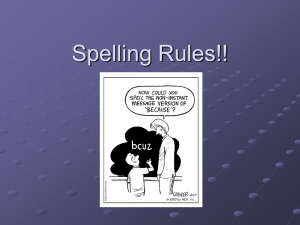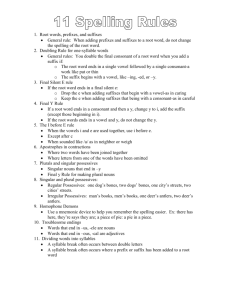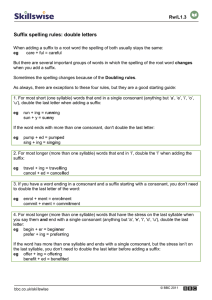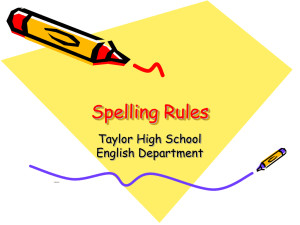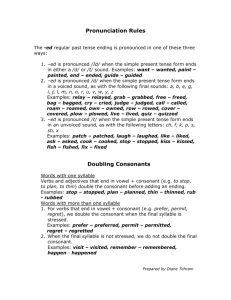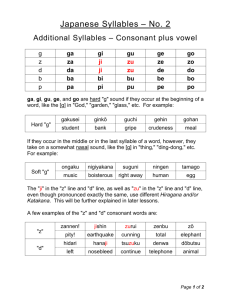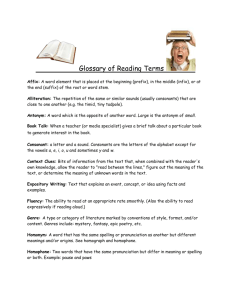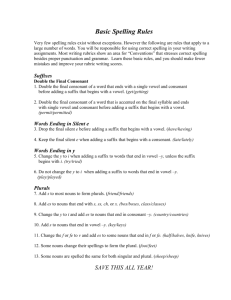B1.3 Spelling Rules and Patterns
advertisement
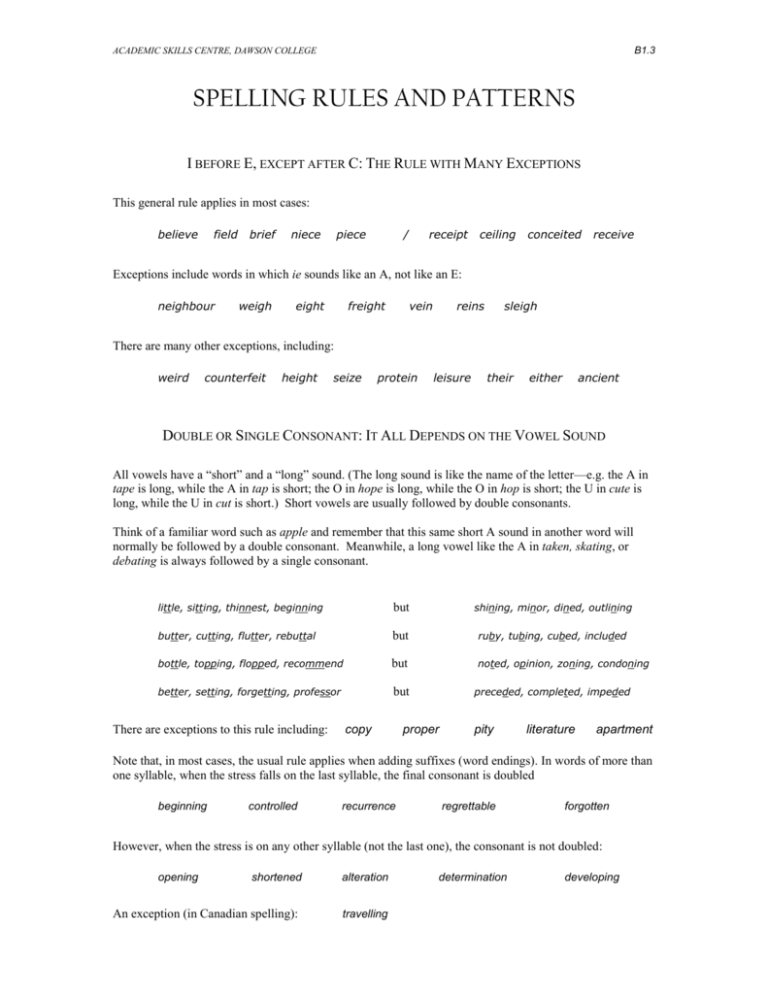
B1.3 ACADEMIC SKILLS CENTRE, DAWSON COLLEGE SPELLING RULES AND PATTERNS I BEFORE E, EXCEPT AFTER C: THE RULE WITH MANY EXCEPTIONS This general rule applies in most cases: believe field brief niece piece / receipt ceiling conceited receive Exceptions include words in which ie sounds like an A, not like an E: neighbour weigh eight freight vein reins sleigh There are many other exceptions, including: weird counterfeit height seize protein leisure their either ancient DOUBLE OR SINGLE CONSONANT: IT ALL DEPENDS ON THE VOWEL SOUND All vowels have a “short” and a “long” sound. (The long sound is like the name of the letter—e.g. the A in tape is long, while the A in tap is short; the O in hope is long, while the O in hop is short; the U in cute is long, while the U in cut is short.) Short vowels are usually followed by double consonants. Think of a familiar word such as apple and remember that this same short A sound in another word will normally be followed by a double consonant. Meanwhile, a long vowel like the A in taken, skating, or debating is always followed by a single consonant. little, sitting, thinnest, beginning but shining, minor, dined, outlining butter, cutting, flutter, rebuttal but ruby, tubing, cubed, included bottle, topping, flopped, recommend but noted, opinion, zoning, condoning better, setting, forgetting, professor but There are exceptions to this rule including: copy preceded, completed, impeded proper pity literature apartment Note that, in most cases, the usual rule applies when adding suffixes (word endings). In words of more than one syllable, when the stress falls on the last syllable, the final consonant is doubled beginning controlled recurrence regrettable forgotten However, when the stress is on any other syllable (not the last one), the consonant is not doubled: opening shortened An exception (in Canadian spelling): alteration travelling determination developing ADDING SUFFIXES: SPECIAL CASES In most cases, a final Y is changed to I when adding a suffix: candy candies easy easiest ugly ugliest tyranny tyrannical carry carrying identify identifying However, the Y remains when an ING ending is added: cry crying hurry hurrying Generally, the silent E is dropped when the suffix begins with a vowel: care caring desire desirous move movable However, when the word has a soft C (making the S sound) or a soft G (the J sound) just before the silent E, the E is kept when adding the suffixes ABLE or OUS. notice noticeable replace replaceable courage courageous Other exceptions in which the E is not dropped: advantage advantageous acre acreage mile mileage Meanwhile, the final E normally remains when the suffix begins with a consonant: care careful retire retirement move movement Exception: For words ending in ue, the final E is dropped when adding any suffix: argue arguing, argument true truest, truly Further exceptions: judge judgment nine ninth (although the word ninety follows the usual rule) OTHER PROBLEM AREAS: CONSULT YOUR DICTIONARY ANCE vs. ENCE endings: e.g. reliance, assistance ABLE vs. IBLE endings: e.g. reliable, available Spelling of the final syllable in words such as concede, proceed, supersede Words containing silent letters: e.g. column, mortgage, sword, pneumatic Words in which some sounds are not pronounced clearly: e.g. February, withdrawal, temperament Words of Greek origin that end with a pronounced E, such as catastrophe, epitome, and psyche Words with double letters: e.g. accommodation, possess, vacuum, committee, assassination vs. vs. independence, persistence irresistible. permissible WM 2004

